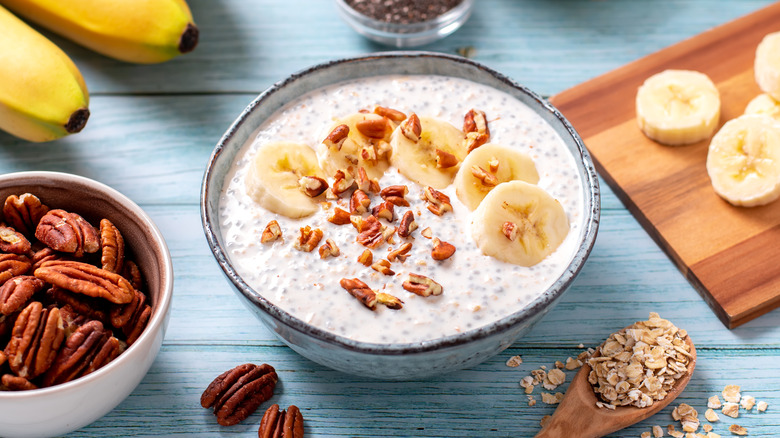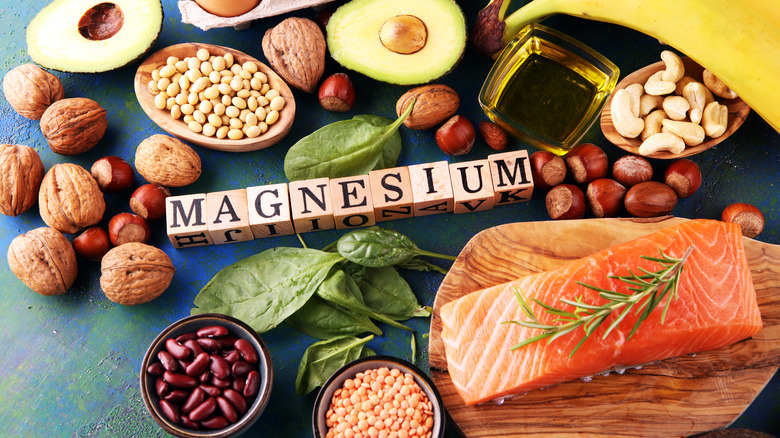Can A Gluten-Free Diet Cause Constipation?
A gluten-free diet is essential for the 1% of the population who has celiac disease (via Healthline). People who have non-celiac gluten sensitivity or a wheat allergy might also need to eschew gluten to avoid gastrointestinal symptoms. Unfortunately, one of the side effects of following a gluten-free diet is constipation (via Delish). That's because many foods with gluten, such as wheat, are also rich in certain nutrients that help with digestion, such as fiber (via Massachusetts General Hospital).
You can find adequate fiber sources through other foods such as fruits, vegetables, and legumes (via Healthline). A medium-sized pear has 5.5 grams of fiber, and a cup of raspberries packs 8 grams of fiber. Artichokes have 6.9 grams per serving, and you'll find 3.6 grams in a cup of raw carrots. Legumes have some of the highest fiber content, with lentils coming in at 13.1 grams per cup of cooked lentils and split peas containing 16.3 grams per cup of cooked split peas.
However, other nutrients could be missing from a gluten-free diet that could contribute to constipation.
Gluten-free diets can be low in resistant starches
Resistant starches are important in the diet because they feed good bacteria in the large intestine and help with constipation (via WebMD). Because resistant starches don't get broken down in the small intestine like other starches, they can help you feel full, lower cholesterol, and reduce your risk of colon cancer, according to The Johns Hopkins Patient Guide to Diabetes.
While resistant starches can be found in milled seeds and grains, the most resistant starches are found in bread and cornflakes, which aren't on a gluten-free menu (via WebMD). When certain starches are cooked and then cooled, they become high in resistant starch. Therefore, you can cook then cool potatoes or rice to add resistant starches to your gluten-free diet. According to Johns Hopkins, overnight oats can also help include resistant starches. Plantains and green bananas are high in resistant starch, but they become regular starches when they ripen. You can also find resistant starches in beans, peas, and lentils.
Refined gluten-free foods are low in magnesium
Magnesium is a necessary mineral for healthy muscle contractions, including the muscles in your gut, according to Mindd Foundation. You might feel constipated if you don't get enough magnesium in your diet. Many refined gluten-free and other processed foods are stripped of magnesium, but wheat bran is high in magnesium (via Amy Burkhart, M.D., R.D.). According to the Harvard T.H. Chan School of Public Health, women should aim for about 310-320 milligrams of magnesium per day, and men should get at least 400-420 milligrams. Magnesium can be found in almonds, peanuts, and cashews as well as salmon, beef, and poultry. You can also find magnesium in bananas and cooked spinach.
You might think twice about adding a magnesium supplement, according to Mayo Clinic. Although many people don't get enough magnesium through their diet, supplementing with magnesium can lead to diarrhea or abdominal cramps.
Although people with celiac disease, gluten sensitivity, or wheat allergies should follow a gluten-free diet, Harvard Health Publishing says that there is no evidence that a gluten-free diet is more healthy if you don't have any of these conditions.



